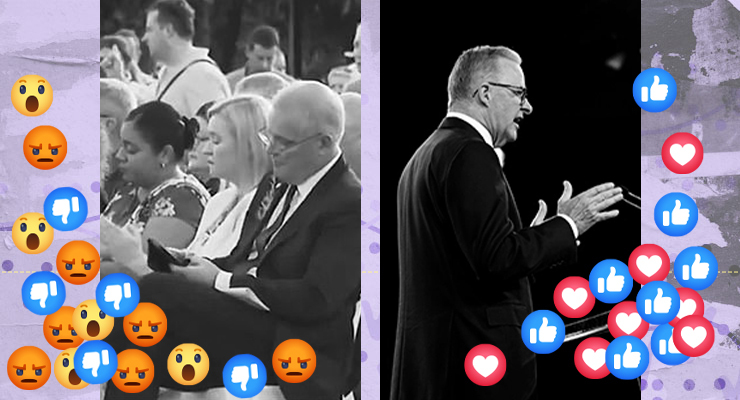
Labor policies and Scott Morrison’s antics are the stories that have drawn the biggest reaction from Australian voters, according to social media analysis conducted by Crikey.
Media monitoring, like Crikey’s coverage of Isentia’s insights during the campaign, can tell us what stories journalists are choosing to focus on. But what are the stories voters are most responding to?
Social media engagements provide insight into the stories that people are reacting to: whether it’s a share on Facebook, an angry quote tweet on Twitter, or an upvote on Reddit.
These don’t necessarily indicate support — after all, someone’s dismissive comment that a policy is rubbish counts as an engagement — nor are they representative of the electorate, but they demonstrate what is “breaking through” by eliciting some kind of reaction.
And importantly, it’s also a rough proxy for what stories are travelling the furthest. The algorithmic nature of social media platforms rewards content based on how much engagement it receives, so these are likely to be the stories that users are seeing the most, too.
The top 10 pieces of online content (generally news stories from mainstream media) each week from the campaign for both parties and their leaders, as shown by social media analysis tool BuzzSumo, show a different story from what you might see from the media’s campaign wraps. These paint a prime minister and party on the defensive, while the opposition’s policies draw a big response.
Throughout the campaign, the coverage of Morrison has shown him reacting. During the first week, dominating social media were his visit to a factory in the process of outsourcing jobs and his broken promise about an ICAC. The week after, his gaffe about being “blessed” not to have a disabled child was four of the five top stories about him. Last week, his coverage was topped by a “carbon tax” scare campaign and him being caught texting at a Anzac Day dawn service.
Anthony Albanese on the other hand has generally received more positive coverage. Despite the first week’s focus on the opposition leader’s gotcha answers, the top two stories were about his commitment to a federal ICAC. In week two, the top stories were about Albanese catching COVID-19. Grace Tame’s interview with him dominated week three.
A similar trend also appears in the coverage of the two major parties. The Coalition and Liberal Party’s biggest stories on social media have been largely negative: testimonials from Liberal Party deserters, fact-checks that found their rhetoric misleading, and pieces about their forthcoming tax hikes. Meanwhile, much of Labor’s top stories have been about its policies on the NDIS, multinational tax crackdowns and a royal commission into robodebt.
What’s topping social media is only a fraction of the story of the federal election. But it’s one signal, among all the noise, that suggests Morrison’s reelection campaign isn’t going to plan.








#ScottyFromMarketing. He admitted to voters in Bass that he is not likeable but urged voters to vote for the Liberal Party nonetheless. This would be OK if the Liberal Party had decent policies but they take “small government” to such extremes that they do not even bother with policy. Announcements. All tinsel no tree Jason Clare got that right.
Scummo is a headline in search of a (finely attuned, focus grouped) policy.
The very definition of Vaccuous
It doesnt matter what the LNPs policies are because their policies are determined by the people bribing them. If the bribers want to change them then they will and the old ideology goes out the window. We dont need to know their ploicies, hell they dont even know them themselves, we just need to know that they are owned by people who are maipulating the LNP for their purposes and not to the benefit of Australia as a whole and the chaos that that causes.
Thats all we need to know.
Can you please repost the data in an easier-to-read format? The ones in the Twitter post are blurry and too small to read, even with my glasses on. lol.
If journalists are such an important element in the totality of things that impinge on the decisions voters make why are, seemingly, most journalists not prepared to address the issue at the heart of our ‘representation’, the character of our ‘representatives’. Is it solely down to fear of our defamation laws?
It seems that much of the media has avoided taking on the documented dishonesty and those other stalwart qualities of our prime minister in any real sense, let alone consistently address his attempts to foist a doctrine of ‘belief’ on a community that didn’t ask for it.
If they did then every time he opens his mouth to utter one more distortion let alone a lie the media would be flagging it in bold. Yet the reality is more likely that they pussy foot around each utterance letting sc_mo (choose a vowel, ‘u’ works well) and all too often other politicians continue uttering untruths and disinformation ad nauseum.
And some people wonder why the ‘voters’ are disengaged.
#prayerroom seems to be forgotten, lost, dead, buried, cremated. Hopefully it will come to fore in the last days.